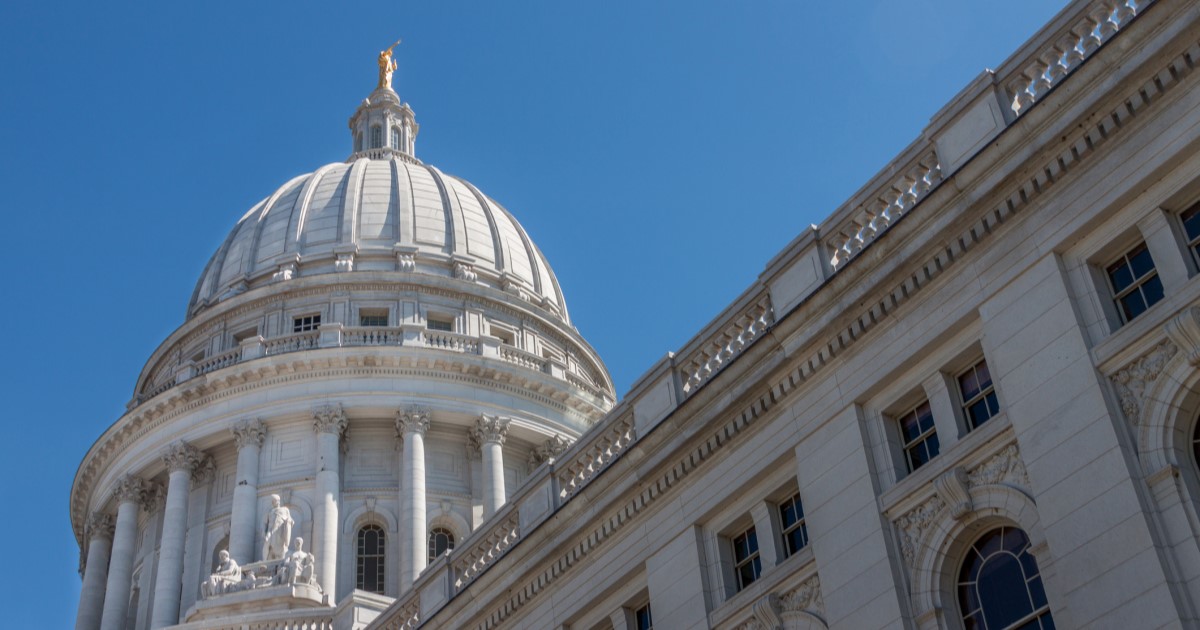
Jan. 9, 2023 – The State Bar of Wisconsin lobbying and government relations program is unique and operates differently than other professional or trade associations. The State Bar is fully committed to the important role we play in positively impacting the legislative process on issues of importance to the courts, legal profession, and the public. While larger policy decisions that impact the judicial system or legal profession are handled by the State Bar of Wisconsin’s elected Board of Governors, the State Bar also has 15 practice section boards that have elected to voluntarily participate in the lobbying program.
Section Boards can take positions that are relevant to their specific practice area on behalf of their section members. These positions can be proactively worked on and studied by section members, or the positions can be reactive both in support and in opposition to pending legislation introduced by legislators. There are many layers to this process including Supreme Court rules, State Bar bylaws, Section bylaws, State Ethics laws and even court cases that govern the State Bar’s advocacy program. But, at the end of the day this all provides an important voice for State Bar members in the State Capitol.
State Bar Practice Section Issues
The State Bar’s section lobbying program has been and will continue to be busy throughout the 2023-24 legislative session. Multiple lobbying sections have proactive legislation that is currently being either studied or drafted.
 Cale Battles, is a government relations coordinator with the State Bar of Wisconsin. He can be reached by
email, or by phone at (608) 250-6077.
Cale Battles, is a government relations coordinator with the State Bar of Wisconsin. He can be reached by
email, or by phone at (608) 250-6077.
The Business Law Section spent years working on codifying and modernizing proposed uniform laws on Limited Liability Companies and Limited Partnerships as well as updating and harmonizing the state’s other business entity statues. These substantial updates passed and became
2021 Wisconsin Act 258. The Business Law Section is now continuing to review several uniform laws this session including amendments to the Uniform Commercial Code on emerging technologies and virtual currencies and Uniform Law Foreign-County Money Judgments Recognition Act.
The Real Property, Trust and Probate Section (RPPT) continues to be proactive in looking at both real estate changes and estate planning. Members of RPPT are assisting in the drafting of a trailer bill to follow-up on both the Uniform Trust Act (2013 Wisconsin Act 92) and Wisconsin’s Digital Property Act (2015 Wisconsin Act 300) that both passed previous legislative sessions with the section’s support. The section also is reviewing remote notarization changes and impacts of the pandemic on estate planning. Finally, the section has begun the review of the Uniform Law on Partition of Heirs Property Act.
The Elder Law and Special Needs (ELSN) Section continues to review proposed elder abuse law changes. The section has always supported efforts to reduce financial elder abuse, but recent efforts would give financial institutions and brokers an ability to freeze transactions of customers or reject valid Powers of Attorney documents that could potentially harm valid transactions. ELSN is also supportive of the creation of a Wisconsin ABLE account program.
Bankruptcy, Insolvency and Creditor Rights (BICR) Section plans to reintroduce language from the 2019-20 session,
Assembly Bill 541, creating exemptions from bankruptcy judgements for Health Savings Accounts and Medical Savings Accounts. The Public Interest Law Section and the State Bar continues to work on legislation regarding ending the practice of allowing courts to order driver’s license suspensions and warrants for the purpose of collecting unpaid ticket debt. The Taxation Law Section is reinvigorating a proposal to establish a ten-year statute of limitations on tax collections
The Family Law Section continues to explore methods in which divorce and custody issues could be streamlined and made more affordable and less conflict-based, while ensuring both parties have access to accurate and updated financial information. The Children & the Law Section is also exploring various opportunities to make adoption a more accessible option for Wisconsin families, while also considering seeking reforms involving child-related hearings.
The Criminal Law and Litigation Sections remain prepared to act on multiple legislative initiatives that have been previously introduced, yet unsuccessfully pursued, as well as any other initiatives that may surface in the upcoming legislative session.
Meanwhile, the Construction Law Section persists in their efforts to clear dormant or excessive liens for homeowners, and the Civil Rights & Liberties Section anticipates involvement with a multitude of issues related to unemployment law and election law.
State Legislature Sets Calendar for 2023-24 Session
The legislature has finalized their legislative calendar for general legislative business for the 2023-24 session. The legislature’s website lists the
calendar dates for the session schedule, as approved by
joint resolution. It is important to note that the full legislature does not meet on all the dates set aside for the year. For example, the State Senate might only meet for one floor session day in January, while the Assembly might meet for two floor sessions in January.
Outside of the legislature’s floor session, public hearings and executive sessions can be scheduled at any time by legislative committees. Committee meetings typically occur midweek. The committee process is the precursor to floor action and provides an opportunity for public participation in the legislative process. Notice of these hearings is posted on the legislature’s
committee schedule site.
What You Can Do: State Bar of Wisconsin Advocacy Network

State Bar members are encouraged to send a message to their lawmakers expressing support on legislative topics which positively affect the legal system using the
Advocacy Network. Action alert messages to state lawmakers should be edited to suit your own thoughts and opinions, and help to demonstrate the breadth of support for policies that prioritize and enhance the justice system.
Don't forget to
subscribe to Rotunda Report and follow us
on Twitter to stay informed and get involved in the legislative process.
